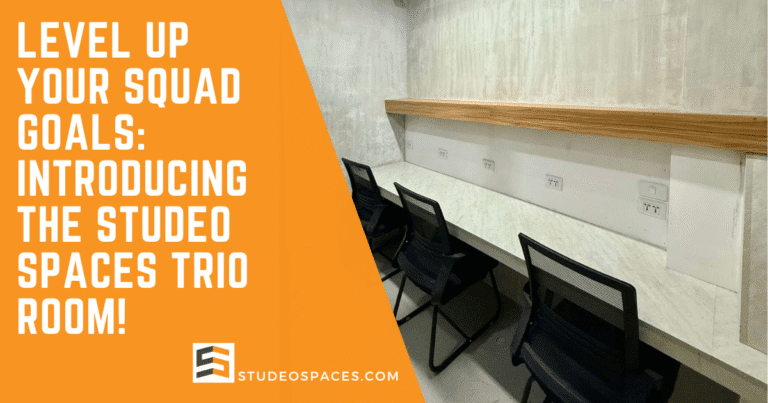
In mastering board exams, adopting key strategies is essential for success. From active revision techniques to time management hacks, much must be learned about making study sessions effective. An exceptional place like Studeo Spaces Study Hub can be instrumental in this journey. Located in Sampaloc, Studeo Spaces is a haven for those seeking hyper-productivity and intense focus, helping students escape distractions and enter the coveted “Flow State.”
This environment is meticulously designed to foster peak performance, making it easier for individuals to immerse themselves fully in their tasks. Open every day from 8:00 AM to 3:00 AM, Studeo Spaces provides the ideal setting for aspiring professionals to prepare meticulously for their exams and achieve their academic goals. Have you ever wondered what strategies can take your board exam preparation to the next level?
Acing board exams is no small feat. It requires dedication, strategic planning, and, sometimes, outside help. This article will delve into proven strategies that can help you excel in your board exams. We’ll also explore how an optimal study environment, like the one that Studeo Spaces Study Hub offers, can significantly enhance your preparation.

Introduction to Board Exams
Board exams represent a crucial phase in a student’s academic journey. They often determine future educational opportunities and can significantly influence career paths. Understanding the importance of these exams and the need for a thoughtful study approach is the first step in achieving success.
Importance of Board Exams
Board exams are standardized assessments to measure a student’s proficiency in various subjects. They serve multiple purposes:
- Academic Benchmark: They measure students’ academic capabilities relative to their peers.
- College Admissions: Performance in board exams often plays a pivotal role in college admissions, scholarships, and other academic opportunities.
- Foundation for Future: They are foundational for future professional exams and career opportunities.
Given their importance, it’s essential to approach board exam preparation with the right strategies and mindset.
Developing a Study Plan
Creating a well-structured study plan is essential. A realistic and comprehensive study schedule helps in covering all relevant topics systematically and efficiently.
Setting Clear Goals
Setting clear goals provides direction and motivation. Here’s how to get started:
- Identify Subjects and Topics: List all the subjects and break them down into smaller topics.
- Allocate Time: Assign time slots to each topic based on its difficulty and your proficiency.
- Set Milestones: Small milestones can make the study process less overwhelming and more manageable.
| Day | Morning (8 AM – 12 PM) | Afternoon (1 PM – 5 PM) | Evening (6 PM – 9 PM) |
|---|---|---|---|
| Mon | Math: Algebra | English: Reading | Science: Biology |
| Tue | Science: Physics | Math: Geometry | Humanities: History |
| Wed | English: Writing | Science: Chemistry | Math: Trigonometry |
Creating a Study Timetable
A timetable helps in maintaining consistency and regularity in studying. Ensure to incorporate breaks and leisure activities to avoid burnout.
Daily Routine Example
| Time | Activity |
|---|---|
| 8:00 AM | Wake up and breakfast |
| 9:00 AM – 12 PM | Study Session 1 |
| 12:00 PM – 1 PM | Lunch Break |
| 1:00 PM – 4 PM | Study Session 2 |
| 4:00 PM – 5 PM | Short Break |
| 5:00 PM – 7 PM | Study Session 3 |
| 7:00 PM – 8 PM | Dinner |
| 8:00 PM – 10 PM | Revision |
| 10:00 PM | Relax and Sleep |
Balanced Study Sessions
Balance is key. Alternate between different subjects and types of activities (e.g., reading, solving problems, revising notes) to keep the brain engaged and avoid fatigue.

Effective Study Techniques
Various study techniques can enhance learning and retention. The choice of technique often depends on the subject and the student’s learning style.
Active Learning
Active learning involves engaging with the material actively rather than passively reading or listening.
- Summarization: Summarizing what you’ve learned in your own words helps reinforce concepts.
- Teaching: Explaining the material to someone else is a powerful way to deepen understanding.
- Practice Problems: Regular practice is crucial, especially in math and science.
Utilizing Mnemonics
Mnemonics are memory aids that can help people remember complex concepts and lists.
- Acronyms: Forming acronyms using the first letters of points to be remembered.
- Visualization: Creating visual images to represent information.
- Rhymes and Jingles: Using rhythmic patterns to remember facts.
Mind Mapping
Mind maps are visual representations that show the relationship between different pieces of information. They are beneficial for subjects that require an understanding of interconnected concepts.
Revision and Practice
Regular revision and practice tests are critical components of effective preparation.
Regular Revision
Plan regular revision sessions to revisit previously covered material. This ensures better retention and understanding over time.
Weekly Revision Schedule Example
| Day | Subject |
|---|---|
| Monday | Math |
| Tuesday | Science |
| Wednesday | English |
| Thursday | Humanities |
| Friday | Full Practice Test |
| Saturday | Doubt Clearing |
| Sunday | Rest and Leisure |
Practice Tests
Taking practice tests under exam conditions helps to:
- Assess Preparation: Understand areas of strength and weakness.
- Time Management: Improve speed and accuracy in answering questions.
- Exam Familiarity: Get accustomed to the format and types of questions.

Importance of a Conducive Study Environment
A good study environment can significantly impact productivity and focus. This is where Studeo Spaces Study Hub comes into play.
Studeo Spaces Study Hub
At Studeo Spaces Study Hub, they believe in creating an environment that promotes concentration and productivity, often referred to as the “Flow State.” Located in Sampaloc, this premier destination is designed to help individuals unleash their full potential.
Benefits of Studying at Studeo Spaces Study Hub
- Minimal Distractions: The facility ensures a quiet and serene environment.
- Optimal Atmosphere: Ergonomically designed spaces support long study hours without discomfort.
- Resource Availability: Access to a variety of study materials and resources.
Their mission is to provide a supportive environment where students and professionals alike can escape distractions and elevate their studies or work. Unlike traditional co-working spaces, Studeo Spaces Study Hub is meticulously designed for those seeking an optimal atmosphere for studying or working.
Elevate Your Studies
Their tagline, “Get Into the Flow,” encapsulates their commitment to helping individuals achieve a state of hyper-focus and productivity. Whether preparing for exams or looking to enhance your professional performance, Studeo Spaces Study Hub provides the perfect environment for you to thrive.
Facility Features
- Accessibility: Open daily from 8:00 AM to 3:00 AM, including weekends, holidays, and inclement weather.
- Convenience: Located at the corner of Dapitan and Dela Fuente Streets, Sampaloc, Manila – Accessible via Google Maps, Waze, or Grab Pins.
- Flexibility: Unlimited in-and-out access to accommodate various schedules.
Studeo Spaces ensures that its environment helps you maintain peak performance and productivity.
Health and Well-being
Studying for long hours can take a toll on mental and physical health. Hence, it’s essential to pay attention to self-care.
Physical Health
Maintaining physical health is crucial. Incorporating regular exercise, balanced nutrition, and adequate sleep into your daily routine is important.
Tips for Physical Well-being
- Exercise: Engage in at least 30 minutes of physical activity daily.
- Nutrition: Opt for balanced meals rich in essential nutrients.
- Sleep: Aim for 7-8 hours of sound sleep every night.
Mental Health
Exam stress is real and can affect your performance. Taking care of your mental well-being is just as important as physical health.
Tips for Mental Well-being
- Relaxation Techniques: Practice deep breathing, meditation, or yoga.
- Breaks: Regular short breaks can rejuvenate your mind.
- Social Support: Stay connected with friends and family for emotional support.
Work-Life Balance
Engaging in hobbies and leisure activities can provide a break from the rigorous routine and prevent burnout.
Finding Balance
- Study Breaks: Take short breaks after every study session.
- Leisure Activities: Engage in activities you enjoy.
- Seek Professional Help: Don’t hesitate to seek help from counselors or therapists if needed.

Final Preparation
As the exam day nears, specific strategies can help streamline your studies and boost confidence.
Recapitulation
A comprehensive review of all topics ensures you haven’t missed any critical areas.
Last-Minute Review Tips
- Focus on Key Areas: Prioritize essential topics.
- Use Summary Notes: Rely on concise notes and mind maps.
- Solve Previous Papers: Focus on past year question papers.
Mock Exams
Simulating exam conditions during mock tests helps acclimate to the actual exam scenario.
Benefits of Mock Exams
- Pressure Handling: Learn to manage exam stress.
- Time Management: Practice finishing within the stipulated time.
- Self-Evaluation: Identify and rectify mistakes.
Exam Day Strategy
Being organized and calm on the exam day is equally important as studying.
Pre-Exam Tips
- Good Night’s Sleep: Ensure adequate rest before the exam day.
- Preparation Kit: Keep all necessary items, like admit card, stationery, water bottle, etc., ready.
- Early Arrival: Reach the exam center well before time.
Post Exam Strategy
After the exams, indulge in some well-deserved relaxation and take time to think about your performance.
Reflect and Analyze
Reflecting on your performance helps you learn from experience.
- Self-Assessment: Analyze your strengths and areas needing improvement.
- Feedback: Seek feedback from teachers or mentors.
Planning Ahead
Depending on the results, plan your next steps, whether it’s further studies, competitive exams, or career planning.

Conclusion
Preparation for board exams is a multi-faceted process that involves effective planning, consistent study habits, proper revision techniques, and a conducive study environment. Utilizing facilities like Studeo Spaces Study Hub can provide the much-needed support and environment to focus entirely on studies. Remember to take care of your health and maintain a balanced lifestyle to ensure optimal performance. Taking board exams becomes an attainable goal with the right strategies and mindset.
So, as you gear up for your exams, remember these key strategies and utilize them to maximize your potential and achieve the success you deserve.
Studeo Spaces Quick Links
- Book a Desk / Room
- Location
- Rates
- Features and Amenities
- Business Hours
- Private Rooms
- Latest News
Stay Connected
- Facebook: https://www.facebook.com/StudeoSpaces
- Tiktok: https://www.tiktok.com/@studeospaces
- Youtube: https://www.youtube.com/@StudeoSpaces






